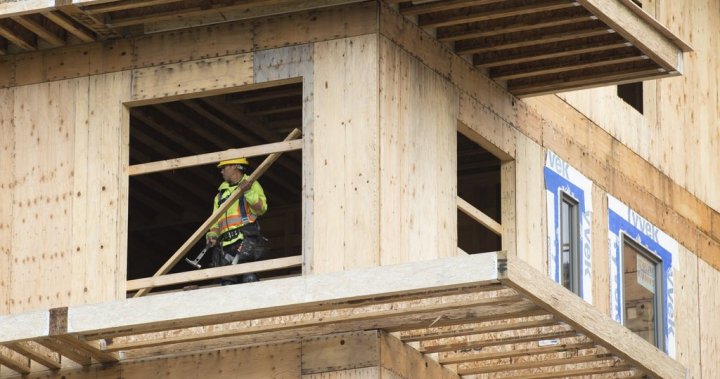Canada
Trade risks add ‘uncertainty’ even as Canada’s housing starts rise: CMHC

Canada Sees Rise in Housing Starts, Driven by Multi-Unit Construction in Quebec and B.C.
Canada’s housing market showed early signs of strength in January 2025, with the annual pace of housing starts increasing by three per cent compared to December 2024. According to the Canada Mortgage and Housing Corp. (CMHC), the seasonally adjusted annual rate of housing starts reached 239,739 units in January, up from 232,492 units in the previous month. This growth was largely fueled by an eight per cent increase in multi-unit urban starts, such as apartments, condominiums, and townhouses, particularly in Quebec and British Columbia. The rise in purpose-built rental properties in these provinces contributed significantly to the overall growth. Urban starts rose to 220,643 units in January from 215,052 units in December, while rural starts were estimated at 19,096 units.
Regional Variations: Montreal and Vancouver Lead the Way, Toronto Sees Decline
Regional data highlighted stark contrasts in housing starts across major Canadian cities. Montreal experienced a remarkable 112 per cent year-over-year increase in actual housing starts in January, driven by a surge in multi-unit constructions. Vancouver also saw a 37 per cent increase, with multi-unit starts playing a key role. However, Toronto experienced a 41 per cent decline in housing starts compared to January 2024, primarily due to a drop in multi-unit projects. These regional disparities underscore the uneven nature of Canada’s housing market, with certain areas thriving while others face challenges.
CMHC Warns of Uncertainty Ahead Despite Short-Term Gains
Despite the encouraging January numbers, CMHC deputy chief economist Tania Bourassa-Ochoa cautioned that foreign trade risks, particularly the threat of a U.S.-Canada trade war, could create significant uncertainty for the housing market. The agency’s six-month moving average of housing starts decreased by 2.5 per cent in January, reaching 236,892 units. While the near-term outlook suggests improved borrowing conditions and a potential rebound in home sales and prices, CMHC projects that housing starts will slow down from 2025 to 2027. This projected slowdown is attributed to a decline in condominium construction, as investor interest wanes and demand from young families diminishes.
Impact of Trade Tensions and Economic Factors on Housing
The CMHC’s 2025 housing market outlook report emphasized the potential impact of trade tensions, particularly the imposition of U.S. tariffs on Canadian goods. Such measures could slow down the economy, reducing housing activity even as improved buying power temporarily benefits some households. In a high-tariff scenario, the agency predicts that inflation would rise, prompting the Bank of Canada to lower its key policy rate to support the economy. This could lead to a prolonged recession, delaying housing recovery and discouraging homebuyers from making purchases.
policy Implications and Long-Term Challenges
The interplay of economic factors, trade risks, and demographic trends presents a complex landscape for Canada’s housing market. Reduced immigration targets could further exacerbate the slowdown in housing demand, particularly in urban centers that have historically relied on population growth to drive construction. As housing starts slow down, policymakers may need to consider measures to stimulate the market, such as incentives for purpose-built rentals or initiatives to support first-time homebuyers.
Looking Ahead: A Mixed Outlook for Canada’s Housing Market
While January’s housing starts offer a glimmer of hope, the broader outlook remains uncertain. The combination of trade risks, economic volatility, and shifting demand patterns poses significant challenges for Canada’s housing market. As the year unfolds, the industry will closely monitor these developments, seeking opportunities for growth while navigating an increasingly complex environment. The interplay of these factors will shape the trajectory of housing construction, home prices, and affordability in the months and years to come.











